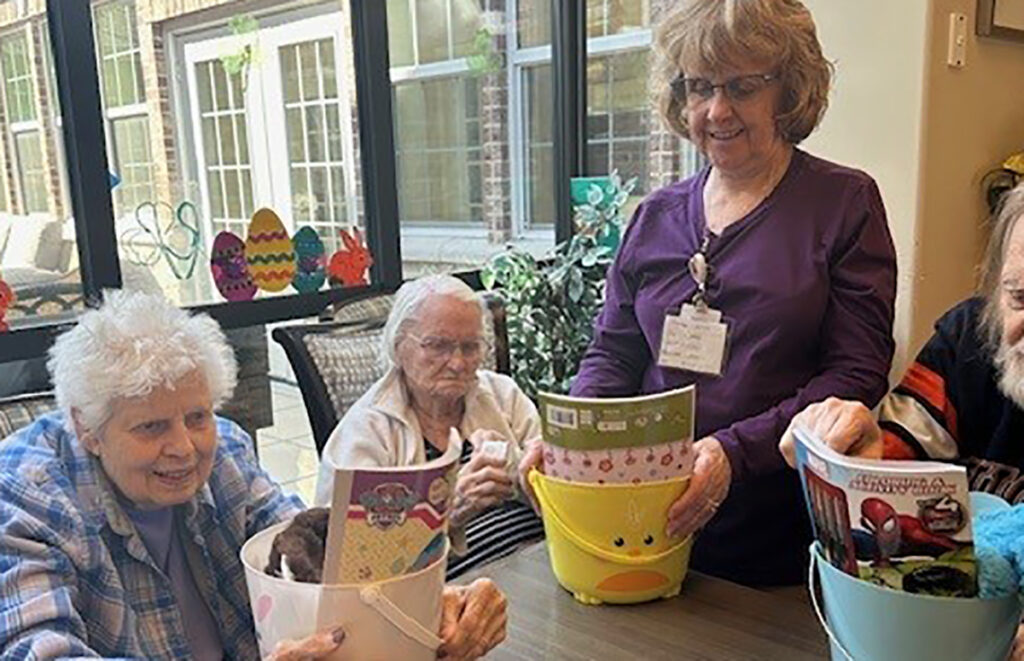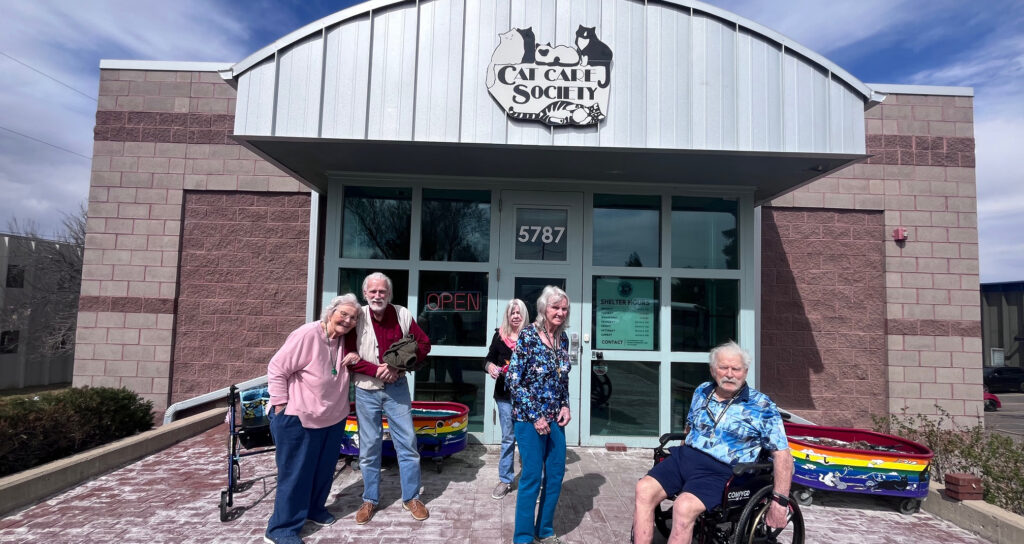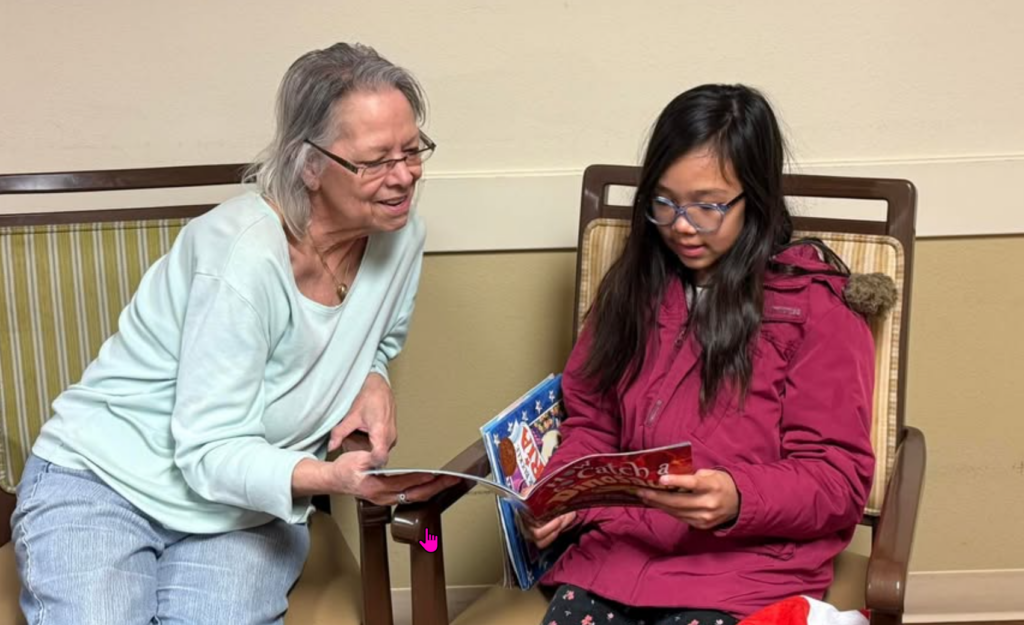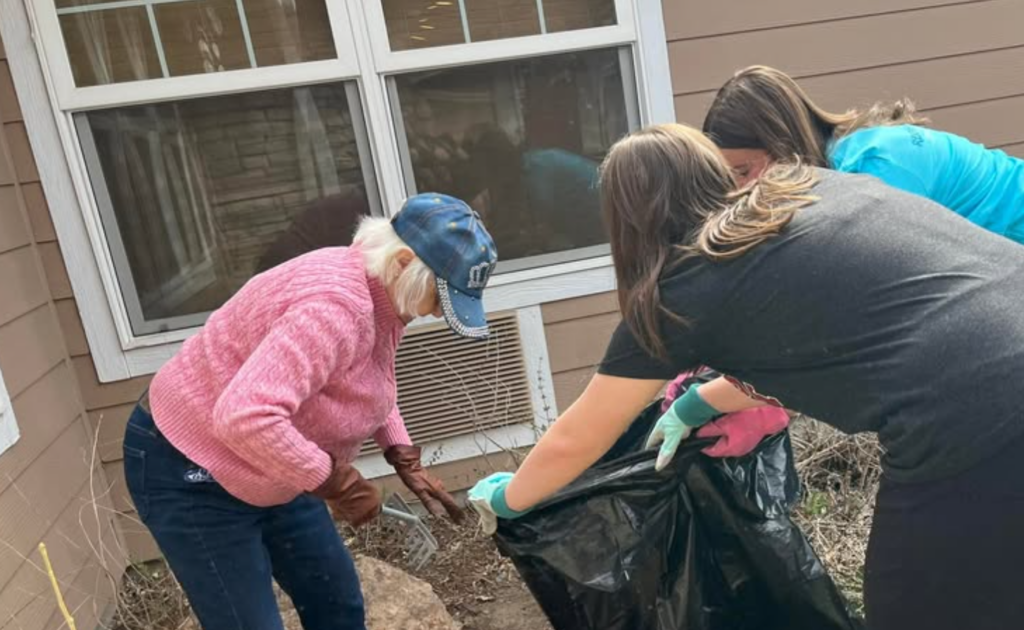One of the biggest challenges for individuals with dementia is navigating a world that is becoming increasingly confusing and intimidating. While most of us welcome variety and spontaneity in our daily lives, individuals with dementia gravitate towards familiar patterns and routines. There is a reason for this – it helps them feel safer and more grounded in reality.
Many family caregivers, unaware of this, may be exposing them to unwanted stimuli and disruption. While well intended, they don’t realize that their efforts to improve their loved one’s environment may in fact do the opposite, leading to increased stress and anxiety. This is especially true for individuals in the middle stages of dementia.
Why is a routine essential for individuals with memory loss?
Familiarity, structure, and consistency can significantly reduce confusion, anxiety, and frustration, while promoting a greater sense of security and comfort. That is why our Anthem Memory Care communities bolster engagement and connection through structure and routine.
Here are some of the ways we add the value of routines into our communities:
Routine and structure should be empowering, never rigid.
That is why our approach to daily life at our memory care communities is to create a gentle structure that empowers each resident to feel safe, supported, and seen. Through this approach, we create communities where residents can thrive with dignity, purpose, and peace of mind.
Our professional nurses, life enrichment team, and caregivers understand that a steady rhythm to the day helps residents feel more grounded and in control, even as their journey with dementia evolves. That’s why we intentionally design each day around predictable, supportive routines.
If you are caring for a loved one with dementia, we encourage you to reach out to any of our communities. We will be glad to answer your questions, provide resources, and share some tips on implementing daily routines that will your loved one feel safe, protected, and empowered.
(Our header image shows an exercise class adjusted for residents with mobility challenges conducted at Cascade Creek Memory Care in Rochester, Minnesota.)
There was at least one, Fairy Stone. And, yes, that really is her name! Fairy, along with her friends at Concord Place Memory Care, celebrated her 97th birthday with a magical photo shoot, transforming them into dazzling pixies and sprites with the help of Smoky Mountain Hospice of Knoxville, Tennessee.
Fairy Stone is the daughter of a coal miner, one of eight children. The fairy shoot reminded her of her high school days when she was named Prom Queen and featured in the local newspaper.
Events like these are not only fun, but they celebrate residents' lives, enabling them to share their unique stories and what makes each one special. The fairy shoot was covered by the Knoxville Daily Sun. You can read the full story and learn more about the lovely Fairy Stone here.
No one paid much attention to the final score in the inaugural "Swing For a Cure" charity softball game between Chisholm Place Memory Care and Brookdale Senior Living because everyone was a winner on this night. Both teams played hard and with spirit. The crowd in the packed stands was vocal and clearly entertained, and the talents of residents of both communities were recognized as well. One Chisholm Place resident played The Star-Spangled Banner on the keyboard, another (a former minor leaguer) tossed out a ceremonial first pitch, and Brookdale residents were heard singing "Take Me Out To The Ballgame."
Those fighting to end Alzheimer's also were winners. While the donations are still being calculated, we expect to have raised right around $7,000 for the Alzheimer's Association® by the time all the money is calculated.
The event was covered by local KAKE Channel 10. You can watch the full video here.
Who knew that these adorable Nigerian dwarf goats would make such great therapy animals? They are friendly, gentle, and clean which make them ideal visitors for memory care communities. And the residents of Liberty Place Memory Care in West Chester, Ohio love their visits!
Lori Orth, CEO of Dream to Reality Farm recently brought in two adorable baby goats, Peppa and Gloria, for the residents to hold and pet. The result was as expected, pure joy, as residents smiled, laughed and engaged with the animals. The goat visit was covered by the Cincinnati Enquirer and you can read the full story, complete with some lovely photos here.
(photo credit - Cara Owsley, The Enquirer)
Anyone who loves gardening will tell you how working in their garden brings a sense of tranquility that soothes the mind and relaxes the body. The process of working with the soil, planting, and nurturing the plants brings a unique therapeutic value that, while hard to quantify, is undisputable in its power.
Because the therapeutic benefits of gardening feel so natural, you might find it surprising to learn that there is science to back up that feeling of wellbeing it brings. Often referred to as “horticulture therapy”, it can involve everything from planting, to growing, to the simple sensory stimulation flowers and plants provide.
A series of studies cited by the NIH (National Institutes of Health) found that horticulture therapy provides distinct benefits to individuals with dementia. It points out that, “As a cognitive therapy, HT helps clients learn new skills and regain lost skills. It is a restorative technique to improve memory, attention, sense of responsibility and social interaction with few to no adverse side effects.
With that in mind, here are three reasons why individuals with dementia respond positively to both indoor and outdoor activities that involve working with plants:
Many of our Anthem Memory Care residents have gardened all their lives. They often share stories of special flowers and plants they remember from their gardens. And they take an active role in our gardens, deciding what to plant, shopping for the plants, and doing the planting and ongoing gardening themselves. Planting and gardening is part of our Pathways of Purpose program, which gives everyone an opportunity to engage in meaningful activities that increase self-esteem and an ongoing sense of purpose.
If you are caring for a loved one with dementia, especially if they once enjoyed gardening, try reintroducing it to them in a gradual way. You might start with some light garden maintenance, watering the plants and clearing out some weeds. If outdoor gardening is not possible, clear off a table and bring in some small plants and a planter. You may be pleasantly surprised at how relaxing it is and how much easier it is for both of you to connect with each other.
That wonderful feeling of connection is one of the reasons why all of our Anthem Memory Care communities have garden areas and planters. We love to work alongside residents each spring to plant everything from flowers to vegetables, nurturing them and enjoying the beauty and joy they bring.
We welcome you to visit any of our Anthem Memory Care communities. We’d love to share our gardens with you and your family!
(Our header image shows a resident of Harvester Place Memory Care in Burr Ridge Illinois neatening up a recently planted batch of spring flowers.)
Vineyard Place Residents Join with Local School Kids to Make Mother’s Day Cards
Local homeschoolers from Our Lady of Fatima Home School Group in Murrieta, California joined residents at Vineyard Place Memory Care to craft homemade Mother’s Day cards to send loving messages to women in local skilled nursing facilities.
“Our residents loved making these thoughtful cards, knowing they would be shared with other mothers outside the community,” said Christopher Balmes, life engagement director for Vineyard Place. “It was a wonderful way to spread kindness, connect with others and give back to the community. Events like this bring joy, encourage creativity and remind our residents how much they can still give and inspire.”
The activity was covered in the local Murrieta Patch. You can read the full article here.
Cornerstone Christian Baptist Church in Murrieta, California got some help with their spring cleaning recently as residents of Vineyard Place Memory Care came to the rescue, eager and ready to get to work.
Residents worked alongside others to clean toys for the children and help spruce up the church. It provided a great opportunity to give back and enjoy connecting with their friends at Cornerstone.
You can read the full Murietta Patch article here.
By Lewis McCoy, Chief Operating Officer
As we celebrate Nurses Week, I want to take a moment to express my deepest gratitude for all that nurses in our industry do every single day. This week is an opportunity to acknowledge and celebrate their dedication, skills, and compassion. At Anthem Memory Care, our nurses go above and beyond in ways that are vital to the quality of care we provide to our residents.
Nurses are the heart and soul of memory care communities. They are there in moments of joy and moments of challenge, bringing not just expertise but empathy, kindness, and understanding to those who need it most. The work they do is not easy, and the challenges they face are real. They work long hours, with a deep commitment to improving the lives of others.
The bond nurses forge with residents and their families is truly unique, and it’s through the hard work of our nurses at Anthem Memory Care that we continue to create environments where our residents can feel safe, loved, and respected.
Our Anthem Memory Care nurses are the backbone of our caregiving team.
At Anthem, we are committed to providing exceptional care to those with memory challenges, and that vision would not be possible without our nurses. They are the backbone of our caregiving team, and their role is critical in ensuring that our residents receive the highest level of care possible. From administering medications to providing emotional support, from monitoring health conditions to celebrating every small victory, our Anthem Memory Care nurses provide the quality of care that defines who we are as an organization.
To our Anthem Memory Care nurses:
I hope you’ll take a moment this week to reflect on the incredible impact you’ve had on the lives of our residents and their families. We recognize the emotional strength it takes to be a nurse, and we honor the compassion you bring to each person in your care.
You are making a difference that is felt every day, and we are so grateful to have you as part of the Anthem family. I want to take this opportunity to say thank you, from the bottom of my heart, for everything you do.
To all nurses everywhere:
Happy Nurses Week! Thank you for your dedication, your compassion, and your unwavering commitment to the health and well-being of those you serve.
KUSA Channel 9 News in Westminster, Colorado recently covered a beautiful story. Greenridge Place Memory Care resident, Eleanor Milligan and fellow residents held a vegetable plant sale to raise money to help Cassidy Waller, one of their caregivers. Cassidy, a much loved member of the Greenridge team, was diagnosed with Multiple Sclerosis three months ago.
Eleanor has loved gardening all her life, so she decided to grow a variety of small vegetable plants to sell to raise the funds for a GoFundMe account set up for Cassidy. All of her fellow residents, families, staff and friends helped make it a success. So far, they've raised $300. Kudos to Eleanor for giving back in such a unique and thoughtful way!
You can watch the full KUSC coverage here.
It wasn’t that many years ago that the world of an individual living with dementia felt much smaller. It was one of increasing isolation and disengagement, not only from their precious memories, but from the world around them. Letters and phone calls were often the only connection available with loved ones who lived remotely.
How times have changed. The explosive growth of technology over the last few decades has produced a wide range of innovative applications geared to help individuals to interact and gain control over their environment like never before. And that includes individuals living with dementia.
What are these technologies and how do they help improve the quality of life for individuals with dementia, as well as for their caregivers and their families? Here are some of the many ground-breaking technologies being used today both in home and senior care environments.
Health and safety technologies:
Communication and engagement technologies:
These technologies will continue to evolve in sophistication. New applications will undoubtedly roll out as well. That’s why it is important for family caregivers to keep up to date on what is available and how each might help them keep their loved one safer and more connected.
While technology brings many benefits, nothing can ever replace the human touch.
At our Anthem Memory Care communities, we use the latest technologies to augment and enhance the daily life experience of our residents and staff. However, we also know where our priorities lie. It is the human element of care which will always carry the greatest value. Likewise, it is important for families to understand that nothing can ever replace their own loving care.
Want to learn more about using technology strategically to help your loved one be safer and more connected? Feel free to reach out to any of our Anthem Memory Care communities. We will be happy to share our experiences with technology and resources with you. We’re here to help!
Families dealing with a loved one’s diagnosis of dementia often find themselves lacking the legal documents needed to pave the way for authorization to make decisions regarding ongoing care and treatment. They are surprised to find themselves locked out of important health discussions with physicians and other care providers. Legal issues may arise that take time to address. So they find themselves scrambling to assemble and execute the documents they need. All this, while their lives are being turned upside down as they struggle to deal with the needs of their loved one.
Legal documents can be very intimidating. Most contain multiple pages full of confusing legal language, requiring multiple sets of actions and notarized signatures to complete. Yet they are an unavoidable starting point towards gaining control over caring for a loved one who is rapidly becoming less capable of handling their activities of daily living and making decisions about their health.
At our Anthem Memory Care communities we speak regularly to family members seeking help assembling all the proper paperwork needed to gain authority over the care of their loved ones with dementia. Many of us have gone through the process ourselves. So we understand how daunting it can be for families.
The Alzheimer’s Association has published a useful list of legal documents for families of loved ones with dementia. Keep in mind that laws can vary by state, so you’ll want to check for any additional requirements for your state. Here are some key documents to be aware of:
Which of these documents do you need and where do you have choices? The POAs are essential to give you immediate access to medical records and begin making decisions on behalf of your loved one. You will want to review the various wills and other documents. This is why you will need to work with an attorney, preferably one who specializes in elder care. They may identify additional special documents as they help you navigate the process with your family.
There are other documents that are important to have on hand, including the following:
Here are some additional legal resources from The Alzheimer’s Association that may be helpful:
If all this feels overwhelming to you, take a deep breath and know that you are not alone. Having to collect documents, organize health records and get your loved one to sign them is the last thing you need right now. And it isn’t easy. Be sure to involve other family members and trusted friends.
Also feel free to reach out to any of our Anthem Memory Care communities. We will be happy to share with you more information and point you in the right direction to get the legal resources and help you need.
(Note that this Anthem Memory Care blog offers insights and tips only. For legal advice you should consult with an elder law attorney.)
Willow Springs Memory Care is holding a special Show & Shine fundraiser event for the local Redding, California community, honoring the memory of Ross Phipps, a former resident and and firefighter for 39 years at the Anderson Fire Department.
The event will include an array of vintage cars, a sock hop, and a barbecue dinner. The proceeds will go to support the firefighters of Redding Fire Station #8.
The event is to be held on April 21st. Local Channel 12/Action News Now has full coverage and details. You can access the video here.
Everybody got in on the action for an early Easter celebration, including an egg hunt at Porter Place Memory Care in Tinley Park, Illinois. Scouts enjoyed searching for eggs alongside the residents, chatting and enoying their time together. The Easter Bunny even showed up!
Our residents love their interactions with young people and the Girl Scout visits are some of their favorites. Some of our residents were scouts themselves in their early lives or remember participating in their own children's or grandchildren's scouting activities.
The early Easter egg hunt was covered by local Tinley Park Progress. You can read the full article here.
Baseball season is back in full swing, and residents of Liberty Place Memory Care in West Chester, Ohio celebrated in a unique way: Their own ball game! Their favorite team? The Cincinnati Reds, of course!
Everyone had a blast rounding the bases and reminiscing about their favorite teams back in the day. Sharing old memories is so important to individuals with dementia as it sparks engagement and communication with those around them.
The unique event was covered by the Warren County Post. You can read the full article here.
April is National Volunteer Month—a perfect time to ask yourself: When was the last time you gave your time to someone else’s joy or comfort?
If you're like many of us, the intention to volunteer is there, but everyday life has a way of pulling us in other directions. Between work, family, and never-ending to-do lists, it's easy to overlook the powerful impact we can have simply by showing up. Yet volunteering doesn’t require grand gestures. It’s about connection, compassion, and creating a ripple of goodness in someone else’s journey.
Volunteering does wonders for emotional wellbeing. And, there is science to back that up. The act of giving can actually stimulate the brain in positive ways. A study cited in National Institutes of Health, found that MRIs of the brains of individuals who had engaged in voluntary acts of giving lit up indicating more brain activity. Scientists attributed that brain activity to the “warm glow” an individual experiences when they donate to a good cause.
Here are a three key ways in which volunteering helps our brains and emotional wellbeing taken from Points of Light, a global non-profit agency that encourages individuals to volunteer in their local communities:
The act of volunteering and giving back is a win-win for residents and their communities.
We hear often how engaging in charitable acts can benefit those who serve more than those served. Many of our Anthem Memory Care residents can speak to that, having been active volunteers in their earlier lives. As a result, they have developed a passion to serve, a passion that even dementia can’t erase.
Giving back is a pure “win-win” opportunity for individuals with dementia that our communities recognize and celebrate. And it is why we look for opportunities for our residents and staff to volunteer their skills, talents, and time to benefit the greater community around them.
Below are just a few of our recent volunteer activities at Anthem Memory Care communities:

Pinnacle Place Memory Care in Little Rock, Arkansas held a special drive, gathering clothing and hygiene items to help those impacted by the California fires.

Residents of Churchill Place Memory Care in Glen Ellyn, Illinois fill Easter baskets for the Metropolitan Family Dupage to distribute to local children in need.

Willowbrook Place Memory Care residents from Littleton, Colorado visited the Lakewood Cat Care Society cat shelter to gift them their hand-crafted cat toys.

Chisholm Place Memory Care residents and staff traveled to their local Target in Wichita, Kansas to hand out rubber duckies, each with a handwritten inspirational message.

Vineyard Place Memory Care residents regularly help visiting students with their reading skills.

And local students love volunteering their time to help out at our communities. Here, local students help Chelsea Place Memory Care residents in Aurora, Colorado clear away winter debris to prepare the ground for spring planting.
When was the last time you volunteered? If you are caring for a loved one with dementia, you may be surprised to find out how adopting a good cause can connect them (and you) to a greater sense of purpose and meaning in your lives. Take some time to research the many volunteer opportunities in your community and select one or two that work for you.
Looking for a few suggestions? Reach out to any of our Anthem Memory Care communities and we would be happy to share some of our favorite causes or help you decide on one that will optimize the experience for you and your loved one.
(Our header image shows residents and staff of Franklin Place Memory Care helping to support the Milwaukee homeless population though donations of clothing and hygiene items.)